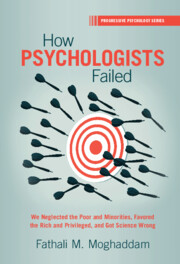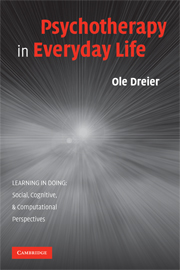How Psychologists Failed
Psychology is a discipline with global influence, but continues to neglect disadvantaged minorities and continues to adopt an incorrect model of science. This volume explains what has gone wrong, and what steps should be taken for psychology to become a constructive international force. Historically, psychologists have focused only on causal explanations of behavior, neglecting normatively regulated behavior and intentionality. By giving greater importance to context and collective processes, moving from 'societies to cells,' psychologists can better understand and explain individual behavior. Poverty is an extremely powerful context that shapes cognitions and actions, with destructive consequences for disadvantaged individuals. The advocation of 'be happy psychology' and 'resilience' as solutions to problems faced by the disadvantaged leads to entrenched group-based inequalities, with the poor stuck at the bottom. Moving forwards, this volume proposes that psychologists should focus on normative systems to ultimately foster a more balanced field of study for the future.
- Provides readers with an accurate picture of how psychology has failed disadvantaged minorities and needs to change
- Demonstrates the scientific limitation of mainstream psychology and offers a way forward to achieve a stronger science
- Presents an alternative path for psychology to follow to become an effective and advantageous international science
Reviews & endorsements
'In this fascinating and provocative book, Moghaddam addresses two persistent biases in mainstream psychology: reductionism and determinism. These biases function systematically to conceal and misattribute collective disadvantage, Moghaddam compellingly argues. By centering collective processes and normative contexts, psychological science will discern and challenge poverty and injustice. A great read!' Winnifred Louis, University of Queensland, Australia
'This book is an intellectual feast from an intellectual force. In compelling detail, Moghaddam shows how the context of our lives affects the way we think, feel, and behave. Our health and happiness, the way we live and die, are determined by our surroundings. We ignore the conditions of our lives at our own peril. If we want to improve our lives, relationships, workplaces, and the world, we must stop believing in the meritocratic myth. Moghaddam tells us how to stop deluding ourselves and how to start promoting wellness, fairness, and worthiness. Compulsory reading, not just for psychologists, but for everyone concerned with our collective fate.' Isaac Prilleltensky, Author of How People Matter: Why it Affects Health, Happiness, Love, Work, and Society
'In this tour de force, Moghaddam exposes the limits of individualized psychology and illuminates how economic inequity and social class affect issues such as mental health, educational performance, and injustice. This eye-opening book should be required reading for psychology students and psychologists.' Michael Wessells, Columbia University, USA
'The author's encouragement provides a path for psychologists to rethink what they bring to their research and to their advocacy. For those in their early career who want to chart a path forward that has a significant potential for positive impact, this book is essential reading. … Highly recommended.' R. E. Osborne, Choice
Product details
No date availableAdobe eBook Reader
9781009081283
0 pages
Table of Contents
- Acknowledgements
- Preface
- 1. Why we must rethink psychology
- Part I. Psychological Processes:
- 2. Cognition and decision-making in societal context
- 3. Mis-measuring intelligence and justifying educational inequalities
- 4. Personality and the power of context
- 5. Consciousness: Decontextualized and contextualized approaches
- 6. Motivation and resilience: Self-help myths and the reality of invisibility
- 7. Group life and diversity
- Part II. Rethinking Behavior in the Larger World:
- 8. Mental health and 'be happy' psychology
- 9. Looking through the wrong side of prison bars: The psychology of injustice
- 10. Psychology for the masses in non-Western societies
- Part III. Looking Ahead
- 11. Rethinking research methods
- 12. Revolution and psychology
- Afterword
- Notes
- Bibliography
- Index.







